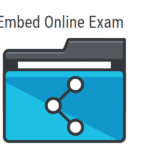Online examination process is helping automation and simplification of exam process.
Pen and paper based exams are getting shifted to online mode. Technology is essential to boost educational services as it can help improving overall processes and it would indirectly ensure that quality of the education is improved for the stakeholders of the education.
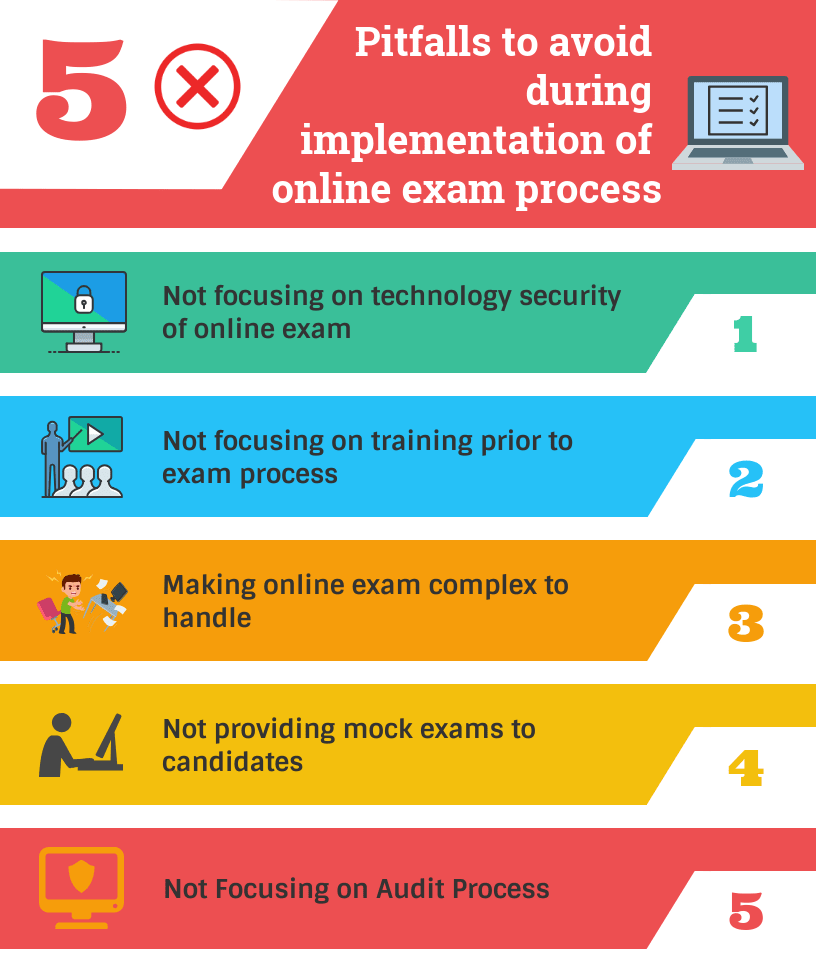
Article Contents
1. Not Focusing on Technology Security of Online Exam
While technology is boon for simplification of exam process, it is essential to ensure highest security standards are maintained to make technology safe and secure for online exams.
Many universities have implemented online exams which are prone to malpractices. Proper authentication and authorization for system access is not maintained. It could result in un authorized students appearing for the exam.
Improper security practices can lead to students copying answers while accessing internet services during exam time.
It is also essential to maintain proper secure channel for protocols like http with SSL certificate. Some of the education institutions did not implement SSL for their exams and it resulted in hackers getting access to question bank data.
In order to maintain highest security standards all the key data and information like credentials, question bank, exam pattern should be stored in encrypted format.
Eklavvya platform ensures that highest security standards are available to conduct fair and error free online exam where malpractices are not possible.
Secure browser ensures that students cannot open any other internet or such programs during online exam process. It helps to prevent copying by the students.
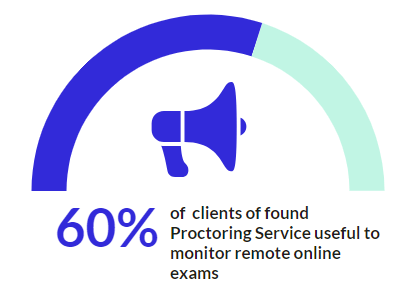
Remote Proctoring ensures that candidate is authenticated and authorized prior to start of exam process and is being continuously monitored during online exam with image/ video streaming activity.
2. Not Focusing on Training prior to Exam Process
The transition to online exams has allowed for the modernization and simplification of the assessment process. However, it is crucial to ensure that students are adequately prepared and confident in their ability to navigate the online exam system. Providing mock exams, training videos, and training sessions can be effective ways to familiarize students with the system and its features and functionality.
Unfortunately, some educational institutions may rush to implement online exams without properly training their students, leading to a lack of understanding and familiarity with the system. This can pose a barrier to the successful execution of online exams.
The Eklavvya platform offers training resources, such as demo videos, to help students become comfortable with the overall workflow and functionality of the system. By providing these resources, students can feel more confident and prepared when taking online exams.

Mock exams are also arranged to ensure that students are familiar with the system and have hands on experience of using it prior to final exams. Mock exam increases confidence of the students for appearing actual exam in online mode.
3. Making Online exam Complex to handle
It is essential to verify the usability of an online examination system before implementing it, as the ease of use plays a crucial role in the successful adoption of the system by its stakeholders. In the past, there have been cases where the implementation of online exams has not been successful due to the complexity of the system.
To ensure the success of an online exam system, it should be user-friendly and easy to understand, even for non-technical individuals. The Eklavvya platform has been thoroughly tested for usability and has been found to be easy to use, even for young students as young as 8 years old. After receiving feedback from students of all age groups, the platform has incorporated best practices for making the system simple to handle, which has played a key role in the successful implementation of online exams.
4. Not Providing Mock Exams to Candidates
Mock exams can be a valuable tool for helping students or candidates become familiar with the online exam system and its features and functionality. A mock exam is a simulated online exam that is meant for practice purposes and follows the same workflow as an actual exam. By participating in mock exams, students can gain a better understanding of the online exam process and become more confident and prepared for the actual exam.
Some entities may overlook the importance of mock exams and conduct the actual online exam without providing any opportunities for practice. This can lead to confusion and uncertainty about the system workflow and functionality, resulting in difficulties in managing the online exam process.
On the other hand, mock exams have several advantages. They can help to increase the confidence of the user in the online exam process, allowing the candidate to approach the final exam with greater assurance and without any doubts or questions about the system. Mock exams can also help to identify any potential issues or challenges that may arise during the actual exam, allowing for timely resolution and a smooth exam experience.
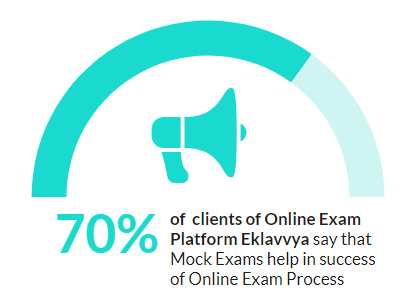
We have conduct many online exams for schools, education institutions. Success rate or overall satisfaction level has gone up due to implementation of mock exams prior to final exams.
5. Not Focusing on Audit Process
Online exams should have a robust mechanism in place for ensuring the fairness and integrity of the assessment process. This may include the ability to verify the authenticity of the exam and provide an audit trail of all events related to the online exam.
An online exam system should be able to record and log all relevant events, such as student login, exam start and end times, time spent on each section, exam location, IP address, and any resume events. This information can be used to verify the authenticity of the exam and provide a transparent and traceable record of the assessment process.
Some universities may implement online exams without sufficient audit processes in place. In such cases, it may be difficult to provide a detailed record of the exam and respond to requests for information, such as under the Right to Information (RTI) Act. This can lead to negative publicity for the university and undermine the credibility of the online exam process.
On the other hand, an effective audit process can play a key role in the success of online exams. By ensuring that all relevant events are logged and traceable, universities can maintain the highest security standards and identify any potential instances of misconduct or malpractice. The Eklavvya platform, for example, ensures that all key events are audited and logged in the system, allowing for easy reference by the administrator and helping to prevent online exam malpractice.

Online examination system provides many advantages in terms of process simplification, ease of result processing. It can save lot of administration cost. However if you do not take case of above mentioned pitfalls then you may have to consider shifting back to traditional exams. Many universities had adopted online exams in a hurry without taking into consideration those pitfalls. It resulted in failure of online exam implementation.
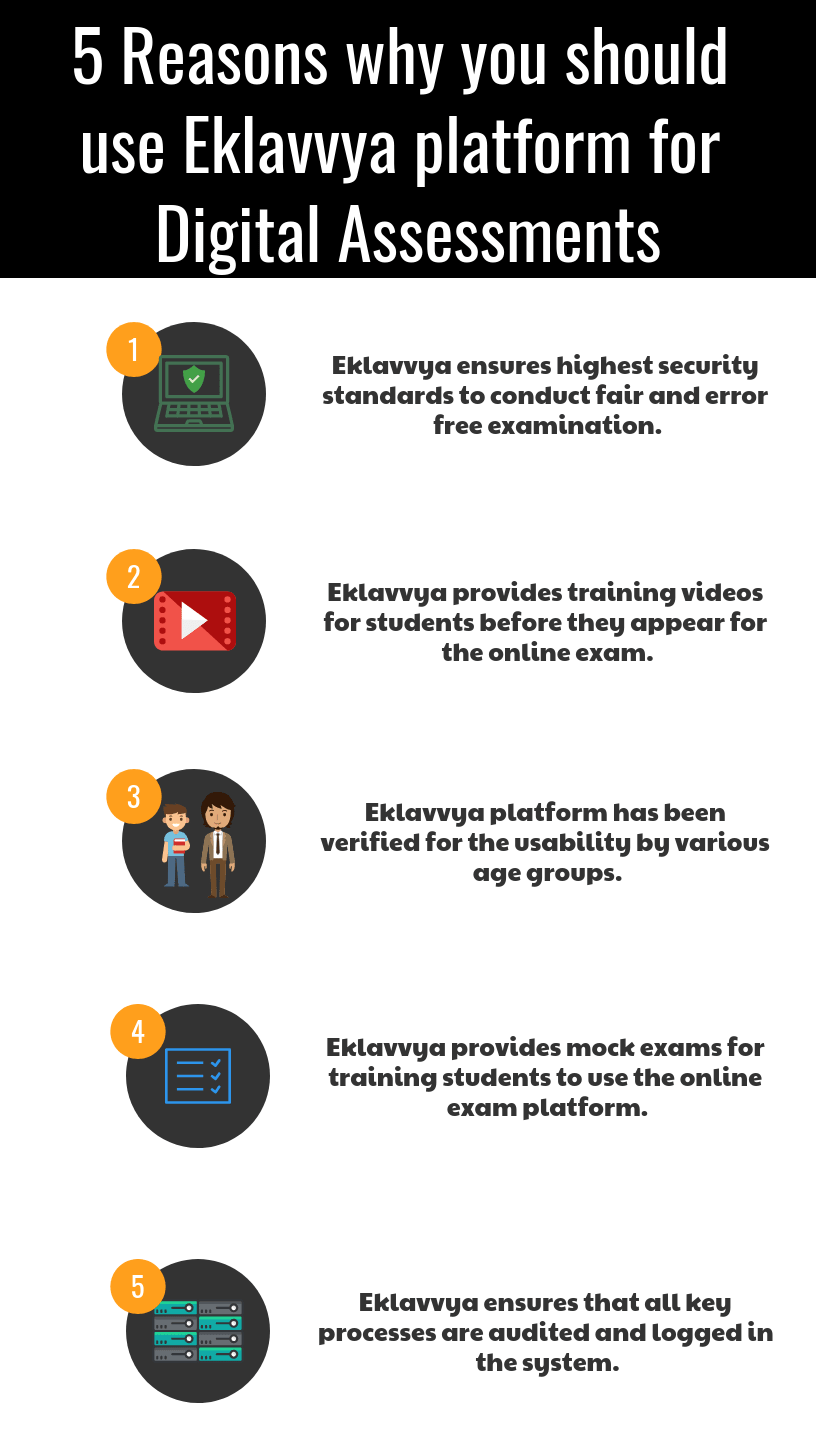
Eklavvya platform following best practices and ensures that all kinds of malpractices are avoided .
FAQs
How can training and preparation help students feel more confident about online exams?
Providing training and preparation resources to students can help to increase their confidence in the online exam process. By participating in mock exams and reviewing training materials, students can become more familiar with the online exam system and its features and functionality. This can help to reduce anxiety and uncertainty about the exam, allowing students to approach the actual exam with greater confidence and preparedness.
Why is it important to have a robust security system in place for online exams?
A robust security system is essential for online exams to prevent unauthorized access and misconduct during the assessment process. Proper authentication and authorization, the use of secure protocols, and encrypted data storage can help to prevent hackers from gaining access to exam materials or sensitive data. Additionally, implementing security measures such as a secure browser can help to prevent students from accessing external resources during the exam.
How can an audit process help to ensure the fairness and integrity of online exams?
An audit process can help to ensure the fairness and integrity of online exams by providing a transparent and traceable record of the assessment process. By logging and recording all relevant events, such as student login, exam start and end times, and exam location, universities can verify the authenticity of the exam and identify any potential instances of misconduct or malpractice. An effective audit process can also help to respond to requests for information, such as under the Right to Information (RTI) Act, and maintain the credibility and reputation of the online exam process.
How can universities provide support and resources to students to help them succeed in online exams?
Universities can provide support and resources to students to help them succeed in online exams by offering access to technical support, online resources, and other materials to help students understand the exam content and format. This may include practice exams, study guides, and other resources to help students prepare for the exam. Universities can also provide support for students who may experience technical issues or other challenges during the online exam process.


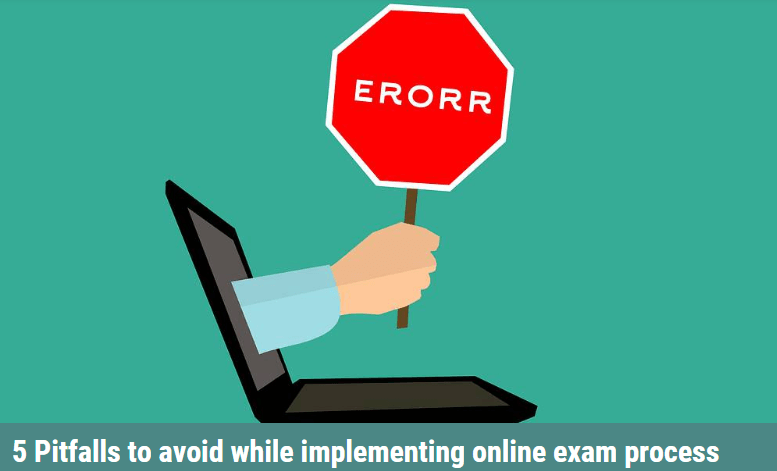



![How Government-Led Exams at 250+ Locations Are Setting New Standards of Integrity [Case Study]](https://www.eklavvya.com/blog/wp-content/uploads/2024/04/Enhancing-Exam-Integrity-Government-Certification-in-250-Locations-150x150.webp)

